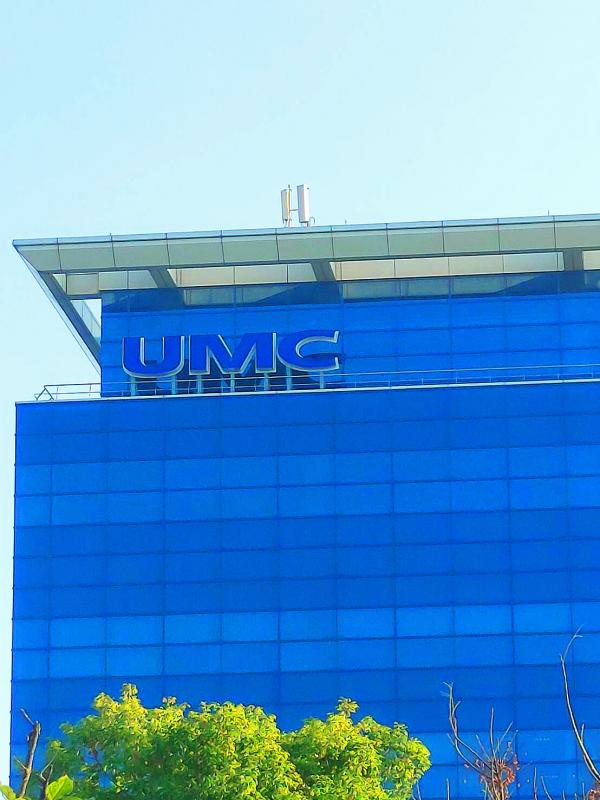The share prices of three major contract chipmakers, including United Microelectronics Corp (UMC, 聯電), were yesterday boosted by media speculation that the firms are in talks with customers to sign new multiyear supply agreements with fixed prices and volumes amid a dearth of chips.
Shares of UMC, the nation’s second-largest contract chipmaker, rose 1.78 percent to close at NT$62.8 in Taipei trading, while Vanguard International Semiconductor Corp (世界先進), a supplier of display driver ICs and power management chips, saw shares rise 0.34 percent to NT$149. Powerchip Semiconductor Manufacturing Corp’s (力積電) shares climbed 0.88 percent to NT$66.61.
The Chinese-language Economic Daily News yesterday reported that customers of UMC, Vanguard and Powerchip have agreed to buy chips at higher prices and fixed volumes for two to three years.

Photo: Grace Hung, Taipei Times
The new contracts would take effect next year, the report said.
This came after it was reported that the world’s top contract chipmaker, Taiwan Semiconductor Manufacturing Co (TSMC, 台積電), was hiking its prices by 20 percent as it wanted to maintain its gross margin at 50 percent or more.
TSMC shares increased 1 percent to NT$605 yesterday.
As chip shortages are expected to continue into next year, UMC last month said that more customers were discussing longer-term supply contracts to secure capacity at agreed prices and volumes.
In April, the Hsinchu-based chipmaker signed agreements with customers to invest NT$100 billion (US$3.6 billion) in expanding capacity, mostly for 28-nanometer chips, at a 12-inch fab, dubbed P6, at Tainan’s Southern Taiwan Science Park (南部科學園區).
The agreements would not take effect until 2023, when the P6 fab ramps up production in the second quarter of that year, UMC said.
The fab, which produces more than 87,000 12-inch wafers a month, would later upgrade to the 14-nanometer process, it said.
“The P6 [fab’s capacity] is covered by the contracts,” UMC told investors last month, adding that customers are required to put down an initial payment to secure capacity.
UMC said it expects demand to continue outpacing supply through the end of next year, driven by increasing demand for chips used in 5G-related applications, the Internet of Things and electric vehicles.
Capacity was tight at all of its technology nodes for 8-inch and 12-inch wafers, and its factories were fully utilized, the chipmaker said.
Vanguard said earlier this month that it had clinched long-term agreements with existing customers.
The contract terms would cover newly increased capacity only, it said, adding that customers were willing to pay higher prices to cover increases in manufacturing costs.

STEEP DECLINE: Yesterday’s drop was the third-steepest in its history, the steepest being Monday’s drop in the wake of the tariff announcement on Wednesday last week Taiwanese stocks continued their heavy sell-off yesterday, as concerns over US tariffs and unwinding of leveraged bets weighed on the market. The benchmark TAIEX plunged 1,068.19 points, or 5.79 percent, to 17,391.76, notching the biggest drop among Asian peers as it hit a 15-month low. The decline came even after the government on late Tuesday authorized the NT$500 billion (US$15.2 billion) National Stabilization Fund (國安基金) to step in to buoy the market amid investors’ worries over tariffs imposed by US President Donald Trump. Yesterday’s decline was the third-steepest in its history, trailing only the declines of 2,065.87 points on Monday and

TAKING STOCK: A Taiwanese cookware firm in Vietnam urged customers to assess inventory or place orders early so shipments can reach the US while tariffs are paused Taiwanese businesses in Vietnam are exploring alternatives after the White House imposed a 46 percent import duty on Vietnamese goods, following US President Donald Trump’s announcement of “reciprocal” tariffs on the US’ trading partners. Lo Shih-liang (羅世良), chairman of Brico Industry Co (裕茂工業), a Taiwanese company that manufactures cast iron cookware and stove components in Vietnam, said that more than 40 percent of his business was tied to the US market, describing the constant US policy shifts as an emotional roller coaster. “I work during the day and stay up all night watching the news. I’ve been following US news until 3am

Six years ago, LVMH’s billionaire CEO Bernard Arnault and US President Donald Trump cut the blue ribbon on a factory in rural Texas that would make designer handbags for Louis Vuitton, one of the world’s best-known luxury brands. However, since the high-profile opening, the factory has faced a host of problems limiting production, 11 former Louis Vuitton employees said. The site has consistently ranked among the worst-performing for Louis Vuitton globally, “significantly” underperforming other facilities, said three former Louis Vuitton workers and a senior industry source, who cited internal rankings shared with staff. The plant’s problems — which have not

TARIFF CONCERNS: The chipmaker cited global uncertainty from US tariffs and a weakening economic outlook, but said its Singapore expansion remains on track Vanguard International Semiconductor Corp (世界先進), a foundry service provider specializing in producing power management and display driver chips, yesterday withdrew its full-year revenue projection of moderate growth for this year, as escalating US tariff tensions raised uncertainty and concern about a potential economic recession. The Hsinchu-based chipmaker in February said revenues this year would grow mildly from last year based on improving supply chain inventory levels and market demand. At the time, it also anticipated gradual quarter revenue growth. However, the US’ sweeping tariff policy has upended the industry’s supply chains and weakened economic prospects for the world economy, it said. “Now